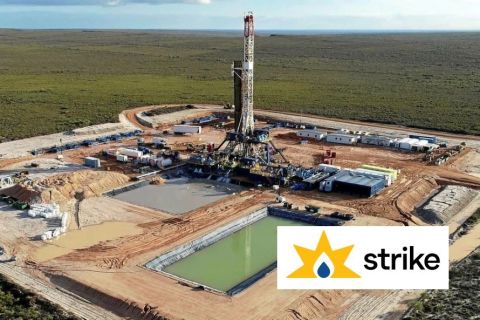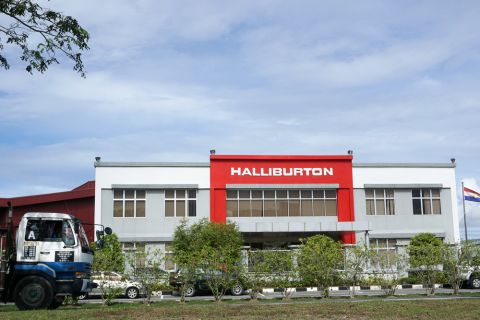Jordan Blum, editorial director, Hart Energy: The oil and gas sector is facing workforce challenges, but how do we solve them? We are here at the annual Kay Bailey Hutchinson Energy Symposium in Austin to find out. This is the Hart Energy LIVE Exclusive interview with Joe Bob Edwards, managing director at White Deer Energy. Thank you so much for joining us.
Joe Bob Edwards, managing director, White Deer Energy: Thanks for having me.
JB: So why is it so important for you to be involved with the Energy Center and be here at the symposium today?
JBE: Well, the center is a great way to get involved in the university and as an alum of the university, I have looked for ways to contribute since I've gotten out of school years ago. So the center mixes a couple of passions of mine, which are the energy industry and making sure that we have leaders coming out of university that actually appreciate the challenges that we face, as well as the opportunities that they could have in the sector.
JB: The economy overall is facing a lot of workforce challenges, but there's also a lot of specific ones to the energy sector. Can I get your take on just how the energy sector, UT and all of higher education are working to help fill the voids that are existing and the challenges that are evolving over time?
JBE: Yeah look, I think we do our small part along with the university that leads the effort in conveying to students the challenges and the opportunities that the energy industry provides. It's one of the largest sectors on the planet. It's the very center of what makes society operate. There are geopolitical issues that impact your job on a daily basis. There are all kinds of reasons to get excited and passionate about a career in the energy industry. And importantly, that can be said for energy transition, sort of the new way of generating power or the new types of fuels that are going to be increasingly prevalent in our society as well as the conventional energy industry, which is not going away anytime soon.
JB: Very good. What do you see as the biggest workforce shortages facing the energy sector right now, and how do you see the energy sector participating?
JBE: I think it's that interest level in the conventional energy space. Years ago before the shale revolution took place, the energy industry was plagued with cycles that were brutal, vast swings up and down that led to workforce expansions and contractions that were not healthy for the industry. Also not healthy for young people looking to build a career in the energy sector. I think with the advent of consolidation in the industry, you've got larger players that are buying smaller players that tend to be a little bit more volatile. The stability in the workforce is much more stable today than it was in years past. So I think for young people looking to conventional energy specifically, they can take that off the table.
The other thing that I find incredibly exciting and increasingly talking with young people here at the center, the technical challenges that they face on a daily basis are real. And so for bright young kids coming out of engineering or business disciplines here at UT, the opportunity to solve problems that impact their companies on a daily basis is really second to none. So I think, again, that's my passion is getting kids fired up about what takes place in the energy industry every day.
JB: Very good. I mean in that vein, yeah, we've got the energy transition, I guess the double whammy of the great crew change in oil and gas, but that also means opportunity. So as you were saying, I mean, is it kind of pushing the opportunity and how things are changing?
JBE: A little bit. I think the center does a good job with the faculty and administration at UT to tell the truth, to get the bipartisan, apolitical facts on the table about what drives society. And there's this perception among popular media outlets that conventional energy is a four letter word, and we are here to tell the students that in fact the conventional oil and gas business in particular can operate in a sustainable way, and it is the key to offering affordable energy to society. So I think the great crew change will take place. I think actuarial tables tell us that, but I think we're doing a good job. We're doing our part to get kids interested in the sector and into the great crew change.
JB: So it's kind of saying all-of-the-above energy and really meaning it. I mean, in that vein, I mean how are investment strategies involved evolving? I mean, there's traditional oil and gas plus all the energy transition companies to sustainability everything.
JBE: Yeah. Investment managers did themselves no favors in the last two decades by aggressively throwing capital into the shale revolution, and returns for investors in the space really suffered. When you couple that with the ESG pressures that investment managers have on a daily basis of certain sources of capital not wanting to invest in traditional energy. It has really placed challenges upon investment managers pursuing strategies in conventional energy. The other side of that coin is, this great energy transition that everyone talks about has attracted massive amounts of capital because investors with their dollars want to impact society in a positive way. Everyone wants to do that. However, I think the pendulum has swung too far in the direction of energy transition investments, and I think returns are starting to illustrate that that sector is not as easy as people were hoping it would be. And so ever so slightly, you're seeing the pendulum swing back to conventional energy strategies being in vogue.
JB: Well, thank you so much for joining us at the KBH Energy Center for this Hart Energy LIVE Exclusive interview. To read and watch more, please visit online at hartenergy.com.
Recommended Reading
E&P Highlights: March 11, 2024
2024-03-11 - Here’s a roundup of the latest E&P headlines, including a new bid round offshore Bangladesh and new contract awards.
Strike Energy Updates 3D Seismic Acquisition in Perth Basin
2024-04-19 - Strike Energy completed its 3D seismic acquisition of Ocean Hill on schedule and under budget, the company said.
Texas Earthquake Could Further Restrict Oil Companies' Saltwater Disposal Options
2024-04-12 - The quake was the largest yet in the Stanton Seismic Response Area in the Permian Basin, where regulators were already monitoring seismic activity linked to disposal of saltwater, a natural byproduct of oil and gas production.
E&P Highlights: April 22, 2024
2024-04-22 - Here’s a roundup of the latest E&P headlines, including a standardization MoU and new contract awards.
Rhino Taps Halliburton for Namibia Well Work
2024-04-24 - Halliburton’s deepwater integrated multi-well construction contract for a block in the Orange Basin starts later this year.




